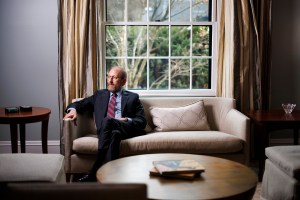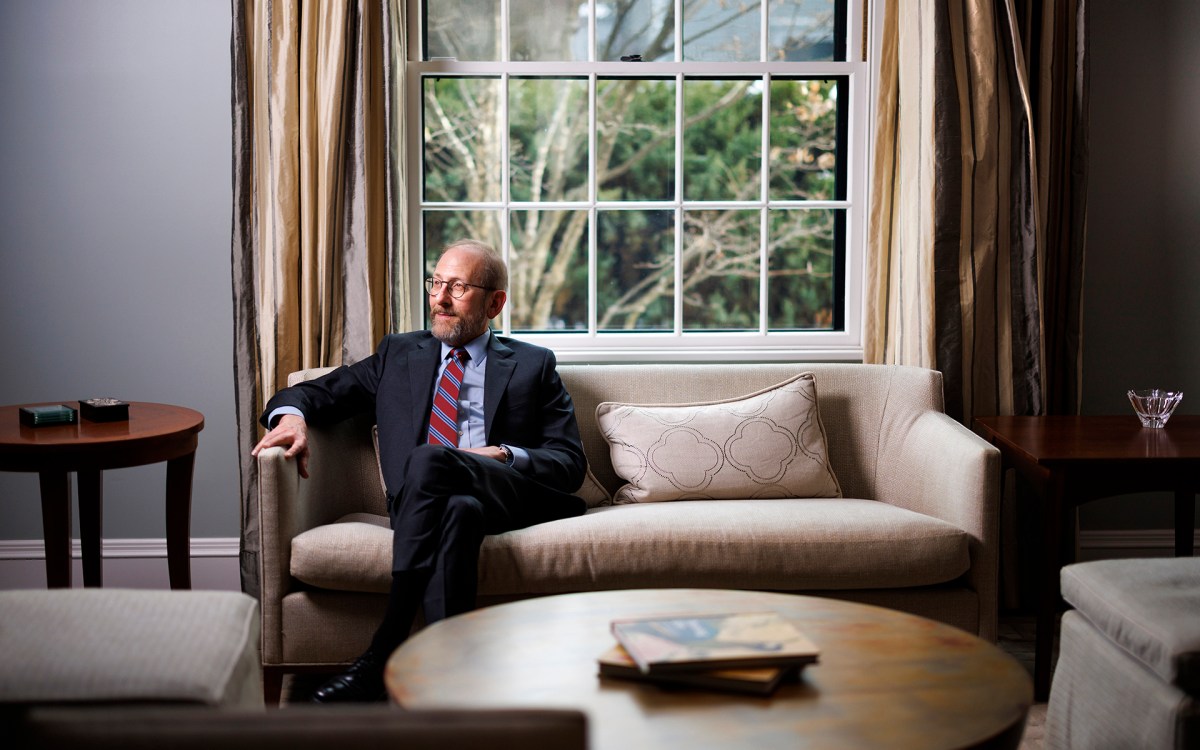Projects help students ‘build bridges’ across differences

Online games and small group discussions provide opportunities for people with contrasting points of view to engage
Funded through the President’s Building Bridges Fund — an initiative started last fall to respond to the preliminary recommendations of the Presidential Task Forces — four student groups launched projects this spring to foster constructive dialogue and build relationships across differences. The projects are part of a larger, University-wide effort to promote dialogue across difference.
The student organizers — from Harvard College, Harvard Law School, and the Kenneth C. Griffin Graduate School of Arts and Sciences — took varying approaches to engaging fellow students in meaningful conversations on challenging topics and creating frameworks for productive discussions.
“When we established the fund, we hoped that we’d attract pilot projects that would spark deep and meaningful conversations across campus,” said President Alan M. Garber. “We want to ensure that all voices are heard at Harvard, and this first round of efforts, launched by accomplished student leaders, gave members of our community opportunities not only to engage in constructive dialogue but also to develop skills that will serve them well in many other encounters.”
“When we established the fund, we hoped that we’d attract pilot projects that would spark deep and meaningful conversations across campus.”
Alan M. Garber
Awarded funding in February to implement projects by the end of the academic year, the students quickly organized speakers, set up logistics, and worked with faculty and staff for guidance and assistance.
Here is a closer look at the projects completed so far.
The Policy Bridges Project
The idea for the project came from a discussion within the Harvard Griffin GSAS Science Policy Group. The group was searching for a way to enable substantive policy discussions and ideas around divisive issues that demand action. When the Building Bridges funding was announced, they saw an opportunity to engage fellow students on these topics with the hope of finding pathways forward.
The Ph.D. student organizers Arya Kaul (bioinformatics and integrative genomics), Lissah Johnson (biological sciences in public health), and Mia Sievers (biological and biomedical sciences) organized two events: a Climate Policy Fireside Chat and a Technology Policy Panel. The format for both events included inviting outside speakers to share their opinions and expertise, while allowing time for discussion and more informal conversation at post-event gatherings.
The Climate Policy Fireside Chat featured Undersecretary Katherine Antos from the Massachusetts Executive Office of Environmental Affairs. The discussion focused on how to move climate policy forward by identifying shared values among groups with different viewpoints.
“We learned that it is possible to make progress on climate issues when you search for common values,” said Kaul. “Forming partnerships with groups that have different viewpoints is possible when you understand what is important to them.”
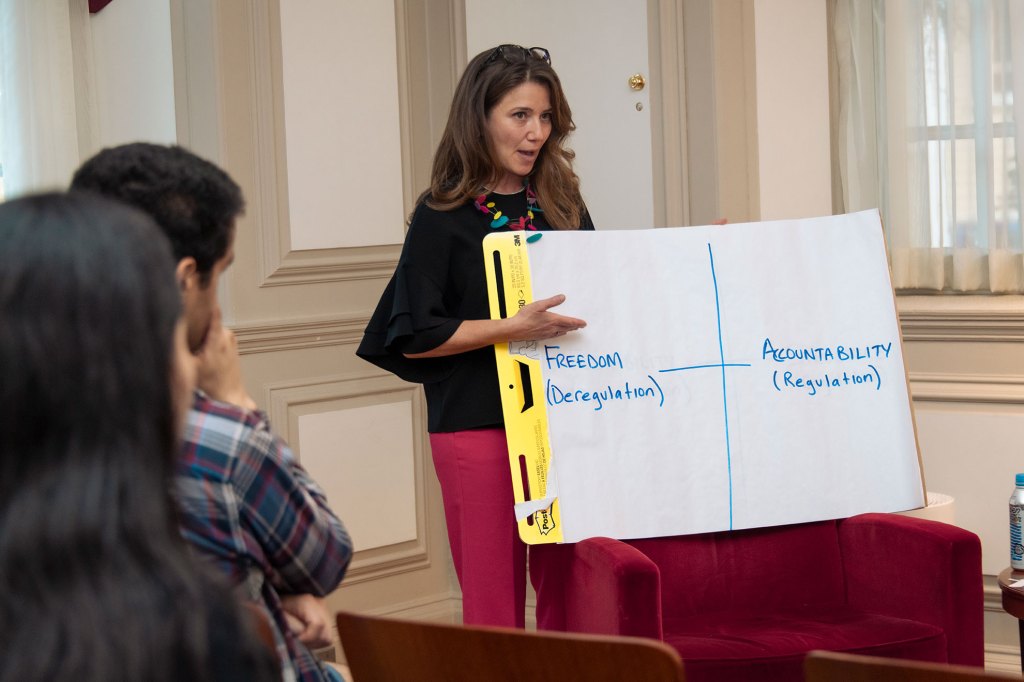
Betsy Miller.
Photo by Ricardo Lopez
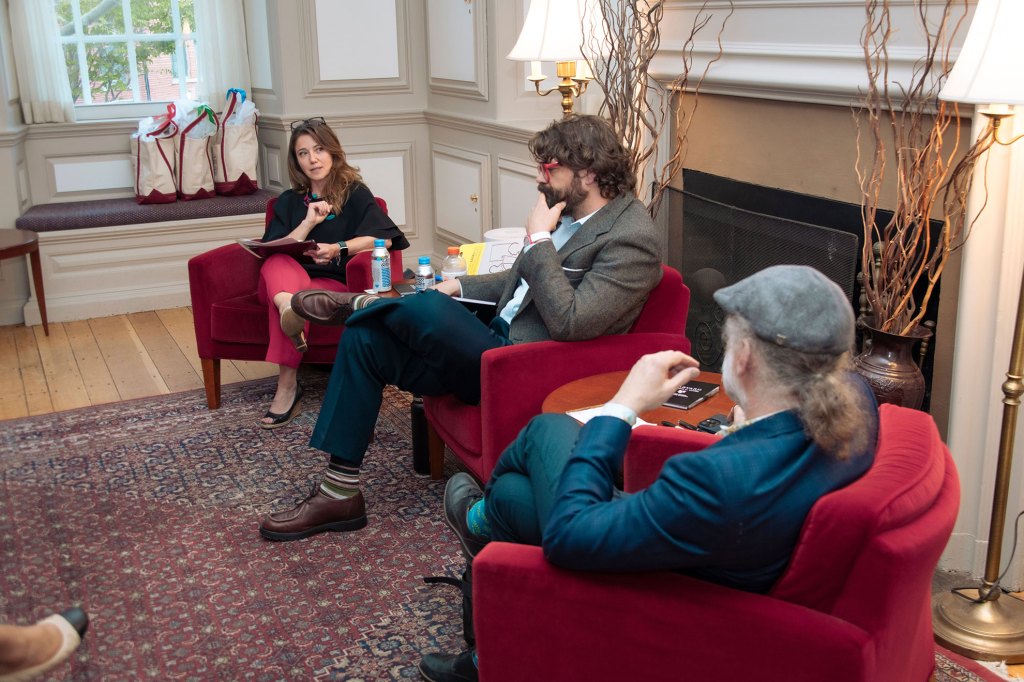
Betsy Miller, Will Rinehart, and Bruce Schneier.
Photo by Ricardo Lopez
The Technology Policy Panel featured Bruce Schneier, lecturer in public policy at the Harvard Kennedy School and a fellow at the Berkman Klein Center for Internet & Society, and Will Rinehart, senior fellow at the American Enterprise Institute and expert at the Federalist Society’s Emerging Technology Working Group, as panelists. The highlight of the panel was the exploration of “polarity thinking” with moderator Betsy Miller.
“It is very helpful to have a shared language and framework for provocative discussions like these,” said Miller, lecturer on law at Harvard Law School. “Polarities are opposites where the benefits of both are needed over time to succeed. Polarities help us move from ‘either/or’ binary thinking to a ‘both/and’ mindset. It’s a powerful tool for engaging across difference and having difficult conversations with curiosity and respect.”
With two events complete, the hope is to continue to host discussions on a variety of policy topics.
“We would love to be able to explore different areas, like healthcare policy, to find those shared values that help us to make progress,” said Johnson. “And with the polarity-thinking framework, we can have those hard conversations in ways that are productive.”
Tango Project
With the announcement of the President’s Building Bridges Fund grant program, Lucas Woodley, a Ph.D. student in psychology at the Griffin GSAS, who works closely with Psychology Professor Joshua Greene in his lab, saw an opportunity for a large-scale deployment of Tango at Harvard. The online game developed in the lab over the past five years promotes openness, respect, and connection across lines of division via a cooperative online quiz game. Here’s how it works:
- Online, 20-minute games are scheduled for a set date and time.
- On the set date and time, players log in and are paired with an online partner anonymously.
- Together, the student pairs answer quiz questions ranging from pop culture to Harvard history to politically charged topics.
Funding through the President’s Building Bridges Fund allowed Woodley, in collaboration with Greene, to coordinate an event across the Harvard community with incentives for participation. The winning pair received Celtics playoffs tickets, and the winning House got $1,000 for their activities fund.
Participating students self-identified as varying grades of liberal or conservative. They were paired randomly with their partners, often playing with someone of differing views. The game is designed to help people with contrasting worldviews learn to trust and respect each other. “What we find is that students have so much fun playing the game,” said Woodley, noting that half of the players gave Tango a perfect 10 out of 10 for enjoyment. “At the same time, they learn how to engage with others on really challenging topics.”
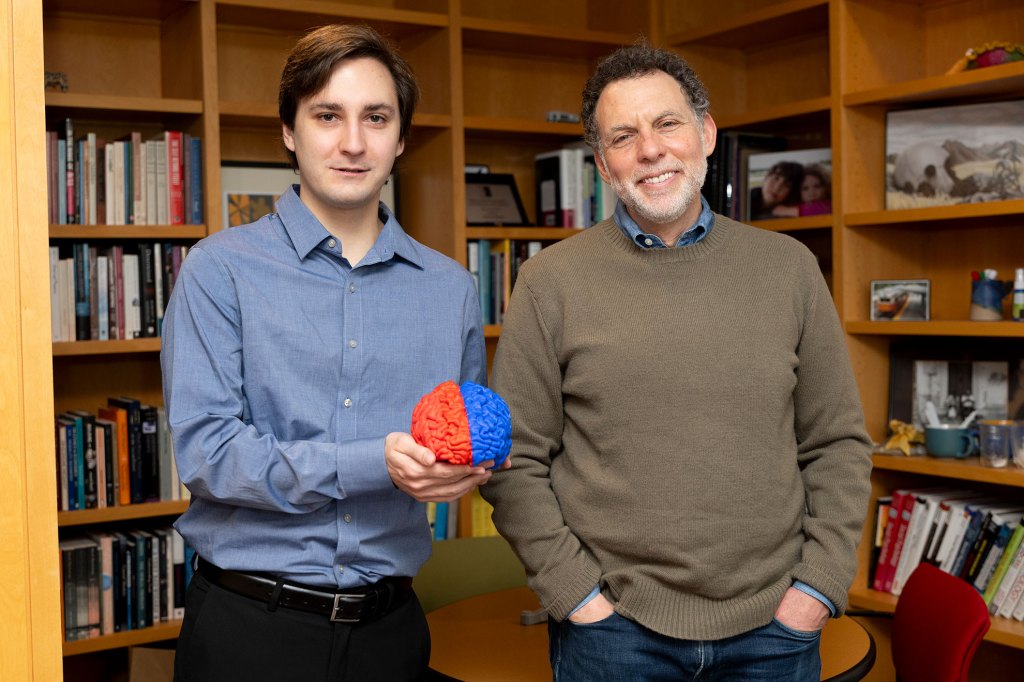
Lucas Woodley (left) and Joshua D. Greene.
Photo by Dylan Goodman
Greene and Woodley recently published the results of the Tango experiment in Nature Human Behavior.
“Tango has so many beneficial outcomes for students in terms of making connections across differences,” said Greene. “Research from the Tango event at Harvard showed that after playing, students were significantly more interested in getting to know students with different viewpoints and significantly more comfortable voicing controversial views on campus.”
Greene and Woodley hope that Tango can be used regularly at moments when large groups of students come together at Harvard, such as at first-year orientation.
Hate & Remediation: Where Does Harvard Go from Here?
The project organized by students at Harvard Law School aimed to spark dialogue among students with different cultural and religious backgrounds. Recognizing the need for a space where students could come together to talk about issues on campus, the Jewish and Muslim student organizers sponsored a discussion examining the nature of hate and how to meaningfully address it on campus.
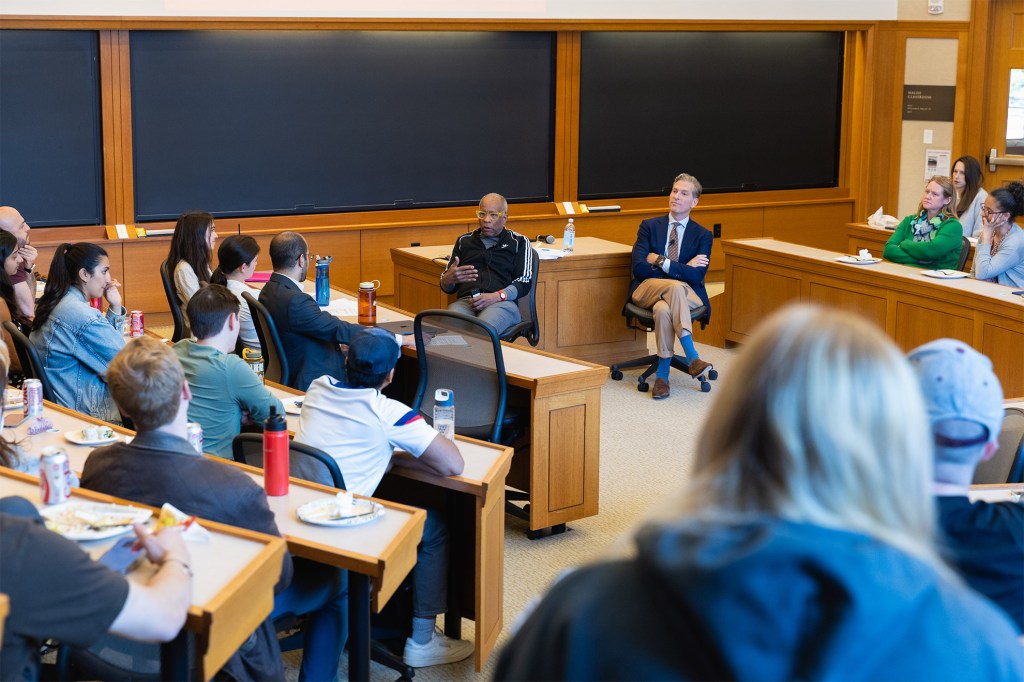
Randall Kennedy (left) and Noah Feldman.
Photo by Lorin Granger
The panel discussion included Noah Feldman, Felix Frankfurter Professor of Law, chair of the Society of Fellows, and founding director of the Julis-Rabinowitz Program on Jewish and Israeli Law at Harvard Law School, and Randall Kennedy, Michael R. Klein Professor at Harvard Law School. Given the then-expected release of the final reports from the Presidential Task Forces on Antisemitism and Anti-Israeli Bias and Anti-Muslim, Anti-Arab, and Anti-Palestinian Bias, they framed the talk as an opportunity for students to think beyond the standard legal remedies and to consider how they as a community could move forward.
More than 100 students participated in the lecture and follow-up discussion. “We worked really hard to create an event where people felt comfortable and welcome,” said Omar Tariq, a second-year law student. “We had students from a wide range of political, religious, and cultural backgrounds. Students expressed that they’ve been looking for more meaningful discussion of the issues we’re facing on campus and were appreciative of our event.”
The event focused on three goals: building relationships across divergent affinity groups; acting against discrimination, bullying, harassment, or hate; and fostering constructive dialogue. The students felt they achieved their goals given the turnout, discussion, and feedback afterward. The strong relationships built while planning the event provides a solid foundation for future events and collaborations, they said.
“This event was a good opportunity for people coming in with different beliefs and ideas to come together with a desire to make campus better. We got to explore how even though we may disagree deeply, it doesn’t mean we can’t also try to make things better for everyone on campus,” said Shanee Markovitz Kay, a second-year law student. “If you have a shared positive goal, there is a lot of good that can come out of it.”
Questions left unanswered
When the President’s Building Bridges Fund was announced, Harvard College students Irati Evworo Diez ’25, Noa Horowitz ’25, and Ari Kohn ’26 saw it not only as an opportunity to bring together a diverse mix of their classmates, but also as a chance to take advantage of the intellect and expertise of their professors. Following an application process that garnered significant interest, students were selected to take part in a series of dinner conversations. The organizers of the project deliberately chose students from diverse backgrounds, beliefs, and viewpoints with the intention of sparking serious, meaningful, and challenging conversations about issues facing Harvard and the world.
“Sometimes it is difficult to have these types of conversations inside the classroom for a variety of reasons,” said Evworo Diez. “We wanted to give students the chance to have these tough conversations in an intimate setting with a select group of students who would really engage on these challenging topics.”
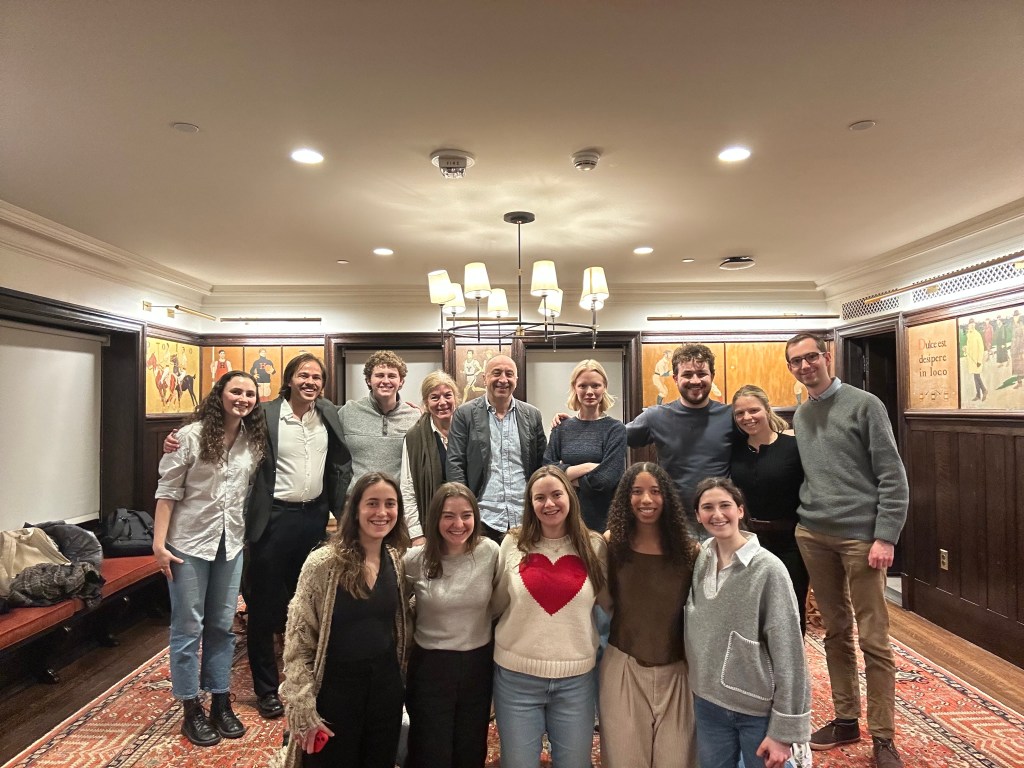
Post dinner photo with students and faculty guests James Wood and Claire Messud.
Photo by Ari Kohn
The general structure of the dinners was to have Harvard professors and other subject-matter experts attend, share their expertise or points of view on a topic, and then have students engage with each other in conversation and debate. It was meant to be the best of a Harvard seminar with its rigor and depth, but in a more intimate and comfortable setting. The topics ranged from economics to campus life to gender and beyond. The feedback was incredibly positive.
“As student organizers, we were grateful President Garber initiated the fund so that we could provide this experience to students and begin to shift the culture on campus around engaging in constructive dialogue across difference,” said Evworo Diez. “Some students said it was one of the most meaningful experiences they had at Harvard.”
The hope is that the dinner series could continue or could be scaled to a GenEd class so that more students have the opportunity to participate in this type of experience.
“This dinner series gave me a lot of faith in Harvard’s capacity to do this work,” said Evworo Diez. “The current media portrayal of Harvard is so different from what is actually happening here. There is diversity at Harvard in the perspectives that students bring to the table — from their background, faith, culture, political viewpoints, and life experiences. Students and faculty were thankful to be forced to have these hard conversations and they were ready to engage.”
“Full participation and belonging don’t happen by accident; they are cultivated through intentional acts of courage, curiosity, and compassion,” said Sherri Charleston, chief community and campus life officer. “The Building Bridges grantees have shown us that true excellence emerges not in the absence of difference, but in the embrace of it. Their work reminds us that when we create spaces for respectful dialogue, we’re not just exchanging ideas. Together, we’re building the foundation for a Harvard where everyone can thrive.”


